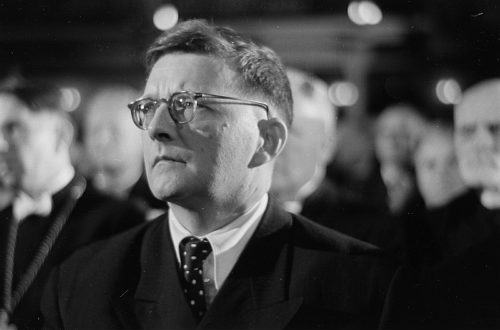“I never lie in my music. That must suffice.”
So said Soviet composer Dmitri Shostakovich. He was perhaps explaining, perhaps excusing the oscillation between the experimental works that he wanted to write (such as his opera, Lady Macbeth of Mtensk, which displeased Soviet authorities, thereby threatening his life) and the over-the-top patriotic symphonies and film scores that won him awards (such as Symphony No. 11, which won him a Lenin Prize and formal rehabilitation). That he wrote such experimental works makes it clear that his over-the-top patriotic pieces must be considered to have been written ironically. Soviet officials could make Shostakovich, as a public figure and national treasure, say certain words in favor of the state or against some unfortunate figure, but they could not prevent those with discerning ears from understanding what his music really meant. His music, unlike his words, could not be made to lie.
The challenge, then, for someone writing about Shostakovich in a work of fiction is how to translate that sentiment into an art form composed of words, which can lie, and which Shostakovich himself did not trust. It is a challenge that Julian Barnes meets in The Noise of Time, a fictionalized remembering of the life of Dmitri Shostakovich, by writing literature that evokes music.
The Noise of Time is divided into three sections—there’s Shostakovich waiting by the elevator in his apartment building to be taken away after Stalin’s disastrous viewing of Lady Macbeth of Mtensk in 1936; there he is again flying back from a humiliating trip to New York as an unwilling artistic representative to the Cultural and Scientific Congress for World Peace in 1949; and there he is once more, finally, riding around in his chauffeured car, provided toward the end of his life by the state for his services. The three sections are lovingly nestled between an introduction and conclusion set on a train platform and told from the point of view of someone whose name, unlike Shostakovich’s, has been lost to history.
But despite the progression of historical events, the story is not linear. The plot unfolds like inspiration does, jumping back and forth and here and there. Time, in the noise of this book, moves biographically, not chronologically. And what holds the snatches of the fictional Shostakovich’s life together is Shostakovich’s remembering of his music in the three vignettes.
It probably helps that Barnes has himself composed musically.
There are leitmotifs: a short story by Maupassant; the impossibility of free love; the inescapability of destiny; a New Year’s toast; leap years; the titular noise of time—these pop into and leave the text, only to reappear later, at once old and new. These themes are played again and again, taking on new meaning each time. The return to the train platform from the beginning at the end makes a sort of coda. And irony, too, which coated and coded so much of Shostakovich’s music, is not only a recurring refrain, but also a well-employed device, separating what Barnes’s Shostakovich says from what he thinks and from what he means, all the while testing the reader to read – or listen – ever more closely between the lines.
This is not to say that Barnes never (to stretch the metaphor too far) hits a wrong note. Barnes is a Westerner writing of a Russian, a situation that inevitably presents potential pitfalls. While Barnes manages to resist the temptation of romanticizing and essentializing the so-called “Russian soul,” he does say that “…to be Russian was to be pessimistic…however much you scrubbed a Russian, he would always remain a Russian.” And there are moments in describing the sheer volume of the terror wrought by Stalin and his contemporaries that the writing (perhaps understandably, given the scope of Soviet suffering and the subject under consideration) plays a bit melodramatically. In describing the men who carried out Stalin’s orders, for instance, who smoke Belomory cigarettes named for the canal construction project on the White Sea for which thousands died, Barnes writes, “Well, there had been 100,000 laborers, so it was possible that some of them might have been morally improved; but a quarter of them were said to have died…They were just the chips that had flown while the wood was being chopped.” That’s film score-level schmaltz.
But then he continues softly, tragically, beautifully. “The NKVD would light up their Belomory and picture in the rising smoke new dreams of wielding the axe.” We are left to watch and wonder as Barnes, like Shostakovich, skips back and forth between major and minor, ironic and implied, heavy-handed and heartfelt.
And so the novel, like Shostakovich’s corpus of work itself, makes a kind of music. Music that brings its fictionalized subject to life again. Music that both conceals and reveals. Music that rewards and punishes its lucky reader-listener. Music that never lies.
•


